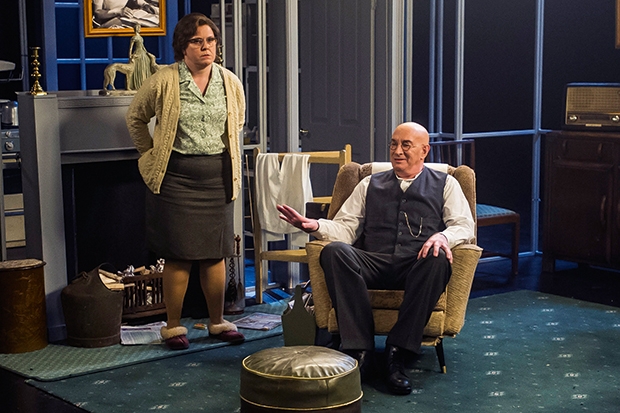I think I might be turning into Alf Garnett. When I was growing up I saw him as an obnoxious, cantankerous, ranting old git that my grandparents’ generation seemed to find funny but who left me cold. Now I’m beginning to identify with him as an unfairly maligned and surprisingly youthful fount of wisdom whose tragedy is to be ignored by maddeningly unsympathetic womenfolk and infuriating kids.
That was my thought, anyway, watching Till Death Us Do Part (Thursday, BBC Four) — a one-off remake of one of Johnny Speight’s original Sixties scripts, with The Fast Show’s Simon Day as Alf. It’s part of a short season, ‘Lost Sitcoms’, commissioned by the BBC to remind us how marvellous it is, this time for having screened the first British TV sitcom, Hancock’s Half Hour, 60 years ago in the summer of 1956.
With typical oversensitivity, the BBC had taken care to find an episode that didn’t have any racist language in it. Alf gets home late from work to discover his tea has been burned because his useless lazy cow of a wife has gone with his feckless daughter to the pictures and just left it under the grill with the gas on low. But instead of showing appropriate contrition, the women just shrug at his entirely justified fury and mock his pitiful attempts to secure himself something to eat.
This is exactly what it is like to be a father. I notice something similar going on in my current favourite sitcom, Friday Night Dinner (Channel 4), about a Jewish family in north London with two appallingly disrespectful sons — one from The Inbetweeners (Simon Bird) and the other from Plebs (Tom Rosenthal). Tamsin Greig is great as the Jewish mum, but the show’s unsung hero is the dad, played Paul Ritter, who spends every episode living in a completely different world from everyone else, thinking distracted thoughts, being continually irritated by intrusive reality, and swearing a lot.
Yes! And is it any wonder when they treat us worse than dogs? All we want is to be fed and watered regularly and have our tummies tickled now and again, but Mum prefers doing that to the real dog, not you, and when your vile kids are anywhere in the vicinity you might as well not exist.
Talking of vile kids, I find myself increasingly despairing of the younger generation with their priggishness, sanctimoniousness, and cry-bully special-snowflake oversensitivity. When watching TV with my offspring, I can’t say anything — not even obviously true stuff about, say, women and general knowledge or contestants playing the ethnic card on Bake Off (‘I’ve just added a bit of kula-kula essence, which is like a cross between kumquat and dragon fruit’) — without being damned as a sexist or a racist. The problem is, I think, that modern kids live in a perpetual year zero. They have no understanding of even fairly recent cultural history, so they write off anyone who doesn’t share their politically correct values as a Neanderthal.
If I were education secretary (Gove really should have done this, while he had the chance), I would make watching old sitcoms a compulsory part of the curriculum. Foremost among these would be the ones that were once family viewing staples but which the BBC now finds too embarrassing to repeat: On The Buses; Love Thy Neighbour; It Ain’t Half Hot Mum, with Michael Bates in blackface; and ’Allo ’Allo (a remake of which the BBC recently scrapped because of fears that sensitive viewers might be triggered by the comedy Gestapo character Herr Flick). Damn it, this was who we were and it wasn’t malicious and we weren’t any more evil than people are today. To airbrush this from our cultural history is just Stalinist.
Nowadays we’re only allowed to watch old, un-PC stuff provided it’s through the correct filter of irony and self-congratulatory knowingness. Unfortunately, another of the adaptations in the BBC’s ‘Lost Sitcom’ season — an update of Are You Being Served? — rather overdid this. As a tribute act, it was faultless: Jason Watkins had John Inman’s every camp mannerism down to a T, from the flouncing walk to the extravagantly theatrical look over both shoulders before declaring, ‘I’m free.’
But times have changed. One reason all those jokes about Mrs Slocombe’s pussy were originally so funny was the suspicion that they’d gone over the heads of the BBC’s fuddy-duddy censors. In the remake, the crudery is so blatant you’re scarcely expected even to pretend that when Mrs Slocombe says ‘my pussy had a sneezing fit’, she’s talking about a cat. As Mark Lawson has astutely noted elsewhere, ‘The audience, the other characters and the BBC editorial compliance department are so in on the gag that it’s effectively a single entendre.’
Anyway, I would bang on more but I’ve got to dash off to see my grandma who is 102, has only once been abroad — to visit the tulips of Amsterdam in a Dakota — and once refused to eat a croissant I offered her because it looked dangerously ‘foreign’. Imagine how she feels about the way things have all gone.







Comments